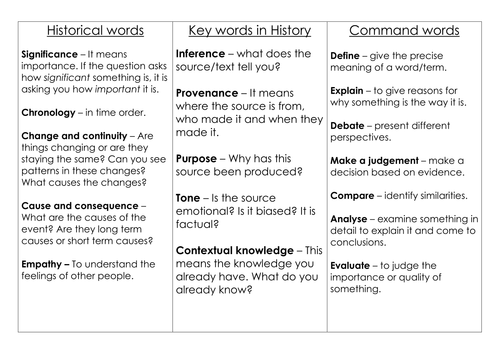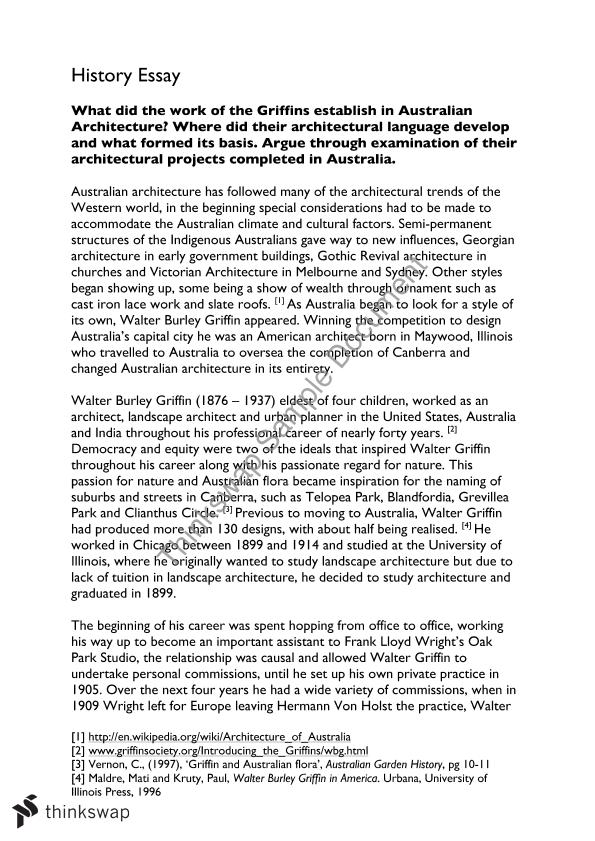
May 25, · A good history essay (also known as a thesis essay) describes an argument about the events that have happened back then. This type of essay is supported by evidence, arguments, and references. After finishing reading, the person must understand why the argument or claim it as such. In other words, an essay is a response to a question, topic or 5/5(1) Sep 11, · Read this list. Scan lists of history essay prompts. Maybe even skim a history essay example or 2 (or 10, or 25). When you find a topic you like even a bit, write it down in your personal list. Add any other topics that come to your mind Feb 15, · Using Personal Pronouns (I, you, he, she, it, we, they, me, him, her, us, and them) The use of 'you' within a history essay can detract from your argument and result in marks being deducted from your essay. This is because formal language is normally used to within academic essays
How to Write a History Essay (with Pictures) - wikiHow
The starting point in the essay writing is to find out what is history essay? It is the testing words to use in a history essay an idea. A good history essay also known as a thesis essay describes an argument about the events that have happened back then. This type of essay is supported by evidence, arguments, and references. After finishing reading, the person must understand why the argument or claim it as such.
In other words, an essay is a response to a question, topic or issue. To write an effective essay, students must first of all study the theme, understand it gather some information through research, then construct a clear and well-organized opinion through writing. It might seem pretty challenging to write this essay, even for stronger students. Do not worry though — each words to use in a history essay you complete helps you become more competent and confident.
In this part, we will highlight the key things that need to be presented in your history essay. After reading it, words to use in a history essay, we can be sure that you get the highest mark you can get and be aware of how to write a history essay.
Following below-described structure, you should see how your writing skills go straight up. So, here are the crucial parts of your history essay:. Due to these paragraphs is the biggest part of your history essay, they have their own, so-called «P. E sub-structure»:. Astonish your examiners with a clear-written middle part. Do not underestimate the importance of the middle paragraphs!
We would like to advise you something. You can be completely creative with your phrases, thoughts, words to use in a history essay, and sayings in the essay. However, do not play with your history writing in a structural way. It will be way wiser to follow the defined plan.
Be critical to yourself as never. Your email address will not be published. We try to make your user experience better. By staying on our website, you agree to our use of cookies.
See more. I agree. So, here are the crucial parts of your history essay: The first part of the writing is the weightiest — the introduction paragraph. We just want to highlight the importance of the first impression that the reader becomes from an introduction. Here you either winner or looser. In order to be the first one, words to use in a history essay, use some eye-catching points of view. This is an opening paragraph in the essay and should contain your main thesis — that is, your line of argument which should be adhered to throughout the essay.
Outline the 3 or 4 main points you have in order to answer the question: these points should later form your main paragraphs in the essay. Show everybody that the question of the essay is understood properly. Define the main terms right, set the parameters of the question.
Middle paragraphs. These paragraphs are essentially the main points that you outlined in your introduction. They should be clearly defined as arguments or factors. Each paragraph should contain one of these arguments.
The danger of trying to fit too many factors or comparisons into a single paragraph is that it becomes complicated and difficult for the examiner to understand.
It should be obvious, from your middle paragraphs, what question you are answering. The easier and clearer it is for you to read, the clearer it will be to the examiner.
Do not make the intro narrative of events — examiners and exam boards hate this. Make sure you create argument and discussion — persuade the examiner that you are correct. E sub-structure»: P — is for point. Make your argument and relate it to the question. The main reason for the outbreak of World War One was German aggression. E — is for explain. Explain why this was the main factor or argument.
German aggression caused increased tension within Europe with the dynamic growth of German power. E — is for evidence. Back up your claim with facts or case studies which prove your point. Aggressive expansion is shown in the Schlieffen Plan, words to use in a history essay caused Britain to declare war on Germany on 4th August Final paragraph. Do not go here and there with your conclusion.
Complete an opinionated summary of your argument — it should not just be a narrative of what you have just written. Make it clear which factor or point is the most important one. Wrap the previously mentioned arguments up. Advice for writing a successful history essay Here are some general pieces of advice for writing a successful essay about history: Start with a plan.
A written plan is your branch. The richer and well-thought your branch is — the greater blossom of words to use in a history essay it will be. Study the question. Well, this is obvious, but the reason why we mentioned it is that a lot of writers are neglecting this crucial part. To be aware is to be armed. It is time to research. After studying the question and developing an initial plan, start to gather information and evidence.
Most will start by reading an overview of the topic or issue, usually in some reliable secondary sources. Use simple English in your writing. Avoid too many complicated words and expressions.
Be persuasive in your work. Previous Post Key to the Perfectly-Written Descriptive Essay, words to use in a history essay. Next Post Learn How to Write a Stunning Narrative Essay. Leave a Reply Cancel reply Your email address will not be published.
Please leave your contact information and we will call you within 15 minutes. Subject of the call Please choose the reason of your request Order placement Payment and authorization Quality of my order General question. Your order ID or. Your customer ID or. Your email address. Please indicate your name. Any additional comments or requests? Cancel Call me back. I have read and accept the Terms of UseMoney Back GaranteePrivacy and Cookie Policy of 1WS. Please mark the checkbox to proceed.
Thank words to use in a history essay for your request! We will contact you within 15 minutes.
6. General Rules for Social Studies Essays
, time: 5:20History Essay: A Complete Writing Guide for Students

May 25, · A good history essay (also known as a thesis essay) describes an argument about the events that have happened back then. This type of essay is supported by evidence, arguments, and references. After finishing reading, the person must understand why the argument or claim it as such. In other words, an essay is a response to a question, topic or 5/5(1) Feb 15, · Using Personal Pronouns (I, you, he, she, it, we, they, me, him, her, us, and them) The use of 'you' within a history essay can detract from your argument and result in marks being deducted from your essay. This is because formal language is normally used to within academic essays A political-economic system with no state, minimal class differences and economic equality. constitutional monarchy. A political system with a monarch whose power is limited and shared with the people. democracy. A political system where the government or
No comments:
Post a Comment